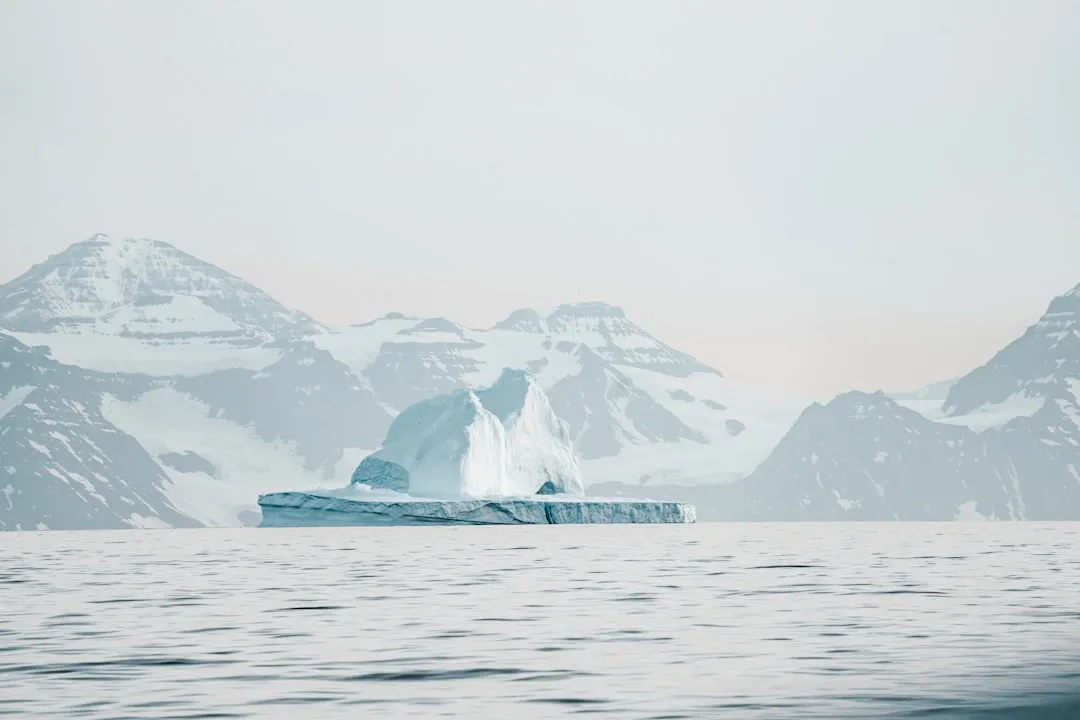Understanding the Geopolitical Landscape of the Arctic
The Arctic, long viewed as a remote and inhospitable region, has transformed into a focal point of global geopolitical competition. As climate change accelerates the melting of ice, new shipping routes and untapped resources are becoming accessible, prompting nations to reassess their strategic interests in this critical frontier. The UK’s recent deployment of artificial intelligence (AI) technologies marks a proactive approach to enhance Arctic security, reflecting a broader trend where technology meets national defense. Foreign Secretary David Lammy emphasized the strategic importance of the Arctic, stating, “The Arctic is becoming an increasingly important frontier for geopolitical competition and trade, and a key flank for European and UK security.” This assertion underscores the intertwined nature of energy resources and geopolitical stability, as well as the necessity for nations to protect their interests in the face of rising threats from hostile states, particularly Russia.
AI Deployment: A High-Tech Response to Low-Temperature Challenges
The UK’s deployment of AI in the Arctic is not merely an upgrade in technology; it represents a strategic necessity to monitor and manage emerging threats. AI systems will be instrumental in analyzing vast amounts of data from various sources, enhancing situational awareness that is crucial for national security. In this context, AI can assist in tracking unusual maritime activities, detecting potential incursions, and safeguarding critical infrastructure. As highlighted by Lammy, this initiative aims to fortify the UK’s ability to “patrol and protect these waters.” The integration of advanced algorithms and machine learning capabilities will allow for real-time monitoring, a vital capability for responding to any hostile actions in a timely manner. Such technology can also provide actionable insights that inform military strategy and operational readiness.
Collaborative Efforts: Strengthening Alliances in the High North
The UK’s Arctic strategy is deeply rooted in collaboration with its allies, particularly Norway and Iceland. Joint naval patrols and training exercises underscore the importance of collective security in an increasingly contested environment. British and Norwegian vessels conduct operations to deter threats from Russia’s Northern Fleet, which has been notably proactive in the region. This partnership will be further solidified through a new UK-Iceland tech collaboration aimed at leveraging AI for enhanced security monitoring. During his visit to Iceland, Lammy will unveil details of this partnership, showcasing how both nations can synergize their technological capabilities. This collaborative model serves as a template for other nations seeking to enhance Arctic security, illustrating that collective action is paramount in addressing complex challenges.
The Implications of Climate Change on Arctic Security
The implications of climate change in the Arctic extend beyond ecological concerns; they directly impact national security. As ice caps recede, previously inaccessible areas are becoming prime targets for resource extraction, leading to heightened competition among nations. Reports indicate that Russia is increasingly using its fleet of nuclear-powered icebreakers to assert its presence and control over these vital shipping routes, which poses a direct threat to NATO’s northern flank. Furthermore, the environmental risks associated with increased maritime activity are significant. The use of aging vessels raises concerns about oil spills and other ecological disasters, further complicating the security landscape. The UK aims to address these challenges not only through military readiness but also by advocating for environmental stewardship.
Investment in Defence: A Long-term Strategy
The UK’s commitment to enhancing Arctic security is part of a broader investment in its defence posture, with significant budget increases planned over the next few years. The Prime Minister has announced a sustained increase in defence spending, aiming to reach 2.5% of GDP by April 2027, with a vision to escalate this to 3% in future parliaments. This financial commitment is crucial for developing advanced technologies like AI, which require substantial resources for research, development, and implementation. This strategic investment not only reinforces the UK’s military capabilities but also enhances its collaborative defence initiatives with European allies. The recent Security and Defence Partnership with the EU exemplifies this commitment, establishing a framework for joint efforts to ensure regional security in the face of evolving threats.
Conclusion: A New Era of Arctic Security
The deployment of AI technologies in the Arctic represents a significant evolution in how nations approach security in this vital region. As geopolitical tensions rise and climate change reshapes the landscape, the UK’s proactive measures underscore the necessity of integrating technology into national security strategies. Through collaboration with allies and a commitment to innovation, the UK is positioning itself to effectively navigate the complexities of Arctic security in the 21st century.
“It’s more important than ever that we work with our allies in the High North, like Norway and Iceland, to enhance our ability to patrol and protect these waters.” – David Lammy
-
Understanding the Geopolitical Landscape of the Arctic
The Arctic
- long viewed as a remote and inhospitable region
- has transformed into a focal point of global geopolitical competition. As climate change accelerates the melting of ice
- new shipping routes and untapped resources are becoming accessible
- prompting nations to reassess their strategic interests in this critical frontier. The UK’s recent deployment of artificial intelligence (AI) technologies marks a proactive approach to enhance Arctic security
- reflecting a broader trend where technology meets national defense. Foreign Secretary David Lammy emphasized the strategic importance of the Arctic
- stating
- “The Arctic is becoming an increasingly important frontier for geopolitical competition and trade
- and a key flank for European and UK security.” This assertion underscores the intertwined nature of energy resources and geopolitical stability
- as well as the necessity for nations to protect their interests in the face of rising threats from hostile states
- particularly Russia.
AI Deployment: A High-Tech Response to Low-Temperature Challenges
The UK’s deployment of AI in the Arctic is not merely an upgrade in technology; it represents a strategic necessity to monitor and manage emerging threats. AI systems will be instrumental in analyzing vast amounts of data from various sources
- enhancing situational awareness that is crucial for national security. In this context
- AI can assist in tracking unusual maritime activities
- detecting potential incursions
- and safeguarding critical infrastructure. As highlighted by Lammy
- this initiative aims to fortify the UK’s ability to “patrol and protect these waters.” The integration of advanced algorithms and machine learning capabilities will allow for real-time monitoring
- a vital capability for responding to any hostile actions in a timely manner. Such technology can also provide actionable insights that inform military strategy and operational readiness.
Collaborative Efforts: Strengthening Alliances in the High North
The UK’s Arctic strategy is deeply rooted in collaboration with its allies
- particularly Norway and Iceland. Joint naval patrols and training exercises underscore the importance of collective security in an increasingly contested environment. British and Norwegian vessels conduct operations to deter threats from Russia’s Northern Fleet
- which has been notably proactive in the region. This partnership will be further solidified through a new UK-Iceland tech collaboration aimed at leveraging AI for enhanced security monitoring. During his visit to Iceland
- Lammy will unveil details of this partnership
- showcasing how both nations can synergize their technological capabilities. This collaborative model serves as a template for other nations seeking to enhance Arctic security
- illustrating that collective action is paramount in addressing complex challenges.
The Implications of Climate Change on Arctic Security
The implications of climate change in the Arctic extend beyond ecological concerns; they directly impact national security. As ice caps recede
- previously inaccessible areas are becoming prime targets for resource extraction
- leading to heightened competition among nations. Reports indicate that Russia is increasingly using its fleet of nuclear-powered icebreakers to assert its presence and control over these vital shipping routes
- which poses a direct threat to NATO’s northern flank. Furthermore
- the environmental risks associated with increased maritime activity are significant. The use of aging vessels raises concerns about oil spills and other ecological disasters
- further complicating the security landscape. The UK aims to address these challenges not only through military readiness but also by advocating for environmental stewardship.
Investment in Defence: A Long-term Strategy
The UK’s commitment to enhancing Arctic security is part of a broader investment in its defence posture
- with significant budget increases planned over the next few years. The Prime Minister has announced a sustained increase in defence spending
- aiming to reach 2.5% of GDP by April 2027
- with a vision to escalate this to 3% in future parliaments. This financial commitment is crucial for developing advanced technologies like AI
- which require substantial resources for research
- development
- and implementation. This strategic investment not only reinforces the UK’s military capabilities but also enhances its collaborative defence initiatives with European allies. The recent Security and Defence Partnership with the EU exemplifies this commitment
- establishing a framework for joint efforts to ensure regional security in the face of evolving threats.
Conclusion: A New Era of Arctic Security
The deployment of AI technologies in the Arctic represents a significant evolution in how nations approach security in this vital region. As geopolitical tensions rise and climate change reshapes the landscape
- the UK’s proactive measures underscore the necessity of integrating technology into national security strategies. Through collaboration with allies and a commitment to innovation
- the UK is positioning itself to effectively navigate the complexities of Arctic security in the 21st century.
“It’s more important than ever that we work with our allies in the High North
- like Norway and Iceland
- to enhance our ability to patrol and protect these waters.” – David Lammy
highlight-underline
highlight-underline
highlight-underline
highlight-underline
highlight-underline
highlight-underline
highlight-underline
highlight-underline
Understanding the Geopolitical Landscape of the Arctic
The Arctic, long viewed as a remote and inhospitable region, has transformed into a…
This section provides additional insights.


